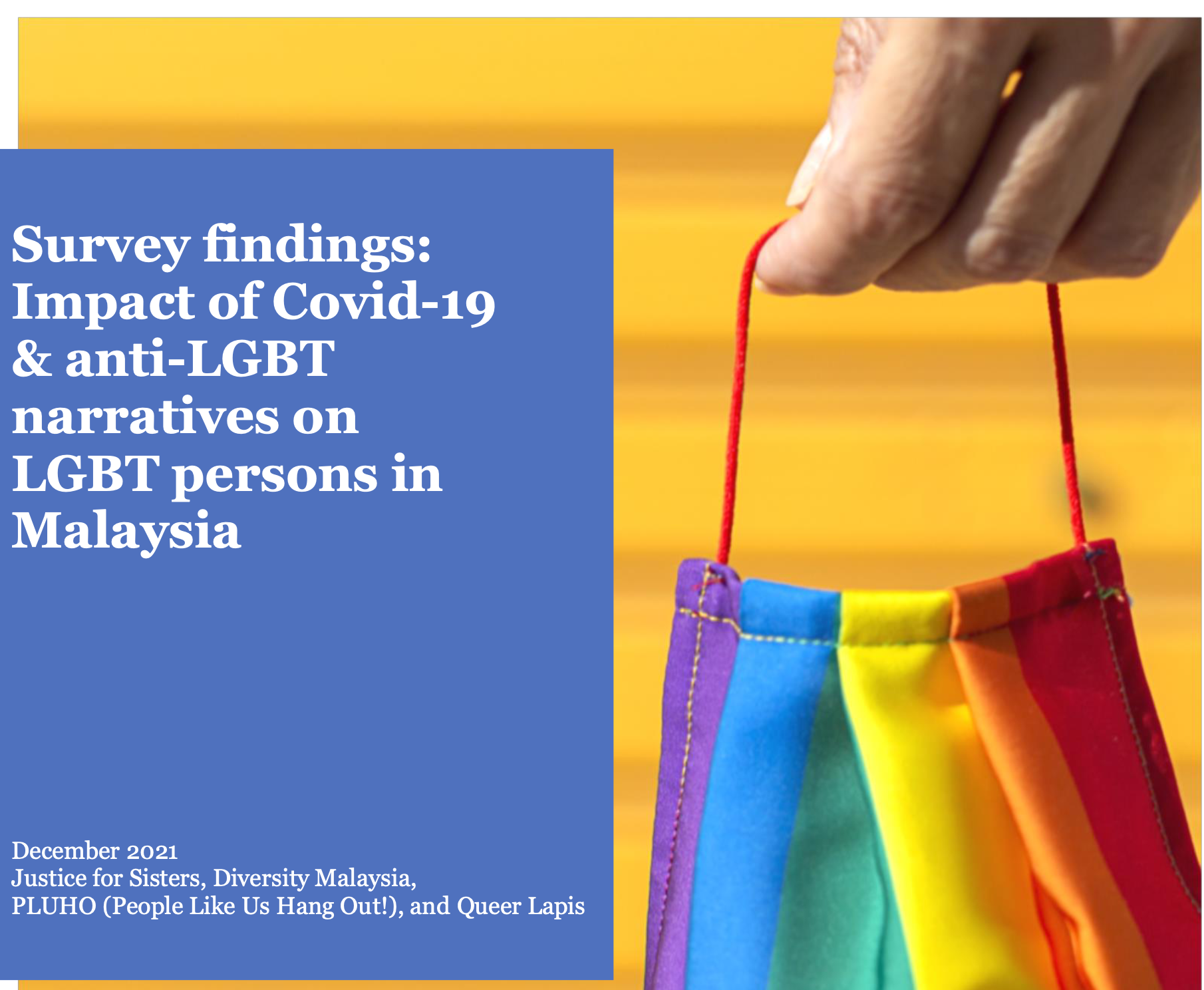Survey findings: Impact of Covid-19 & anti-LGBT narratives on LGBTQ+ persons in Malaysia out now

“Survey findings: Impact of Covid-19 & anti-LGBT narratives on LGBTQ+ persons in Malaysia” by Justice for Sisters, PLUHO (People Like Us Hang Out!), Diversity and Queer Lapis analyzes impacts experienced by 220 LGBTIQ persons in Malaysia in relation to Covid-19 and anti-LGBT narratives in Malaysia. 6 of them identified expats and others.
With the support of LGBTIQ groups, human rights defenders and others, the survey was rolled out between July 16 and August 2, 2021. The survey finds:
◉ Increased minority stress, self-censorship, concerns over personal safety, and a widening trust deficit in government agencies are some of the highest scoring impacts of anti-LGBT narratives in Malaysia among the respondents.
More than half of the respondents, 55.9%, noted that they experienced increased stress and mental health burden due to anti-LGBT narratives. Meanwhile, at least 47.7% respondents noted that they toned down their ‘gayness’, ‘queerness’ and ‘transness’ at home and other places to avoid trouble. Interestingly, 20% of the respondents noted that they experienced increased anti-LGBT conversations at home, family chat groups or among family members.44.1% said that they reduced their social media postings or sharing of LGBT content. At least 85 respondents (38.6%) have thought of or made plans to migrate or seek asylum as a result of the increasing anti-LGBT sentiments.
◉ The survey focused on four types of anti-LGBT narratives 1) Anti-LGBT statements by politicians 2) Proposed anti-LGBT amendments 3) Hate speech online 4) Media sensationalism
In total, only 5.9% – 11.4% respondents said that the four types of anti-LGBT narratives had no impact on them.
◉ Only 13 respondents (5.9%) stated that media sensationalism of LGBT news has no impact on them. Among all four types of anti-LGBT narratives, media sensationalism scored lowest in terms of having no impact on the respondents, second highest level in relation to stress among respondents and highest level of multiple forms of discrimination or violence.
◉ Comparatively, anti-LGBT statements by politicians and media sensationalism cause slightly higher level of stress among the respondents. Meanwhile, proposed anti-LGBT amendments and hate speech online show higher level of direct discrimination among the respondents.
◉ Only 7.3% of the respondents said that they experiences during the pandemic were not exacerbated by the increasing anti-LGBT narratives in Malaysia. 94 respondents (42.7%) felt that the increasing anti-LGBT narratives exacerbated their experiences during the pandemic. Meanwhile, 62 respondents (28.2%) said maybe.
◉ Access to redress remains low. 70 respondents (31.4%) said that they did not report cases of discrimination that they faced during the pandemic. Only six of the respondents (2.7%) said that they reported their cases of discrimination to the police or government agencies, such as the Labour Department. Meanwhile, only two respondents (0.9%) reported their experience of discrimination to Suhakam.
◉ Only 37 respondents (16.8%) indicated that they are comfortable and very comfortable in reporting cases of discrimination and violence that they face to government agencies. Meanwhile, 59.1% of the respondents noted that they were not comfortable reporting cases to government agencies.
Read the full report here
A summary of the findings can be downloaded here
Justice for Sisters, PLUHO (People Like Us Hang Out!), Diversity and Queer Lapis would like to express our deepest gratitude to everyone who participated in the survey. We thank you for your openness and willingness to share your experiences. We are also grateful to LGBTIQ groups, human rights defenders, community organizers and others who shared the survey with your networks.










